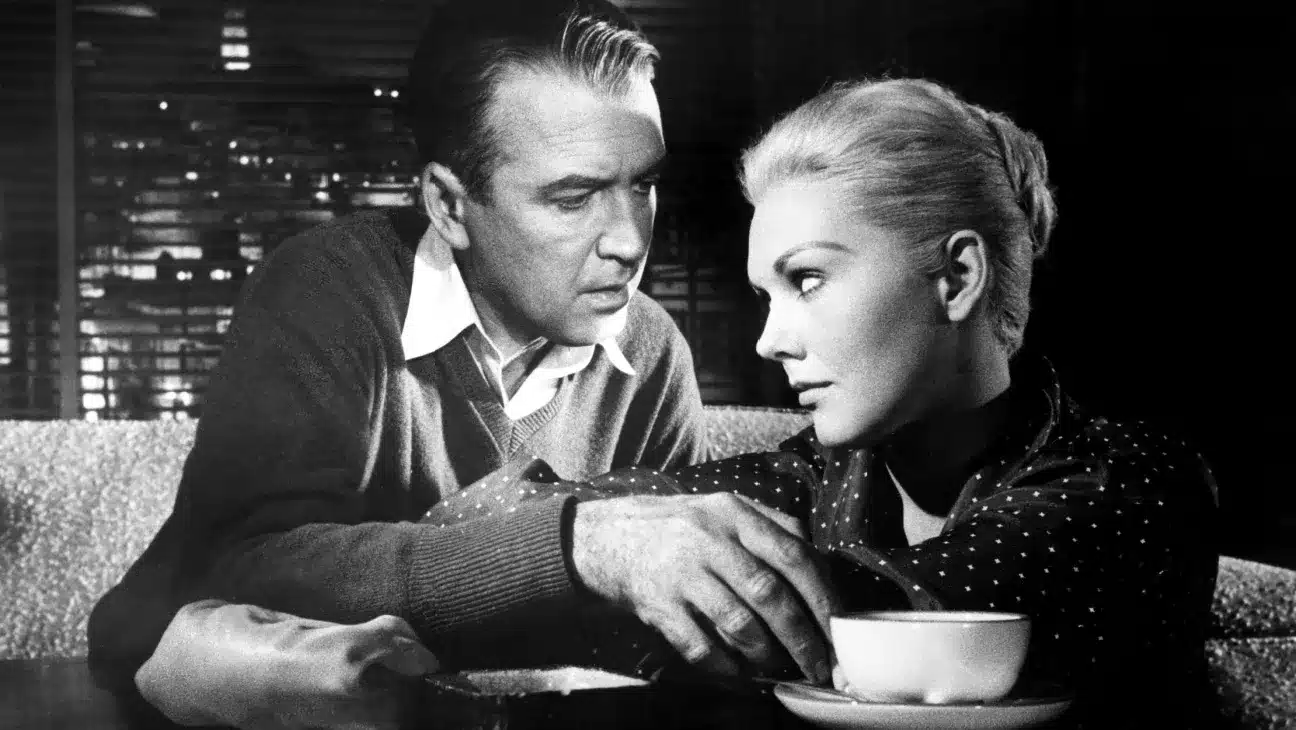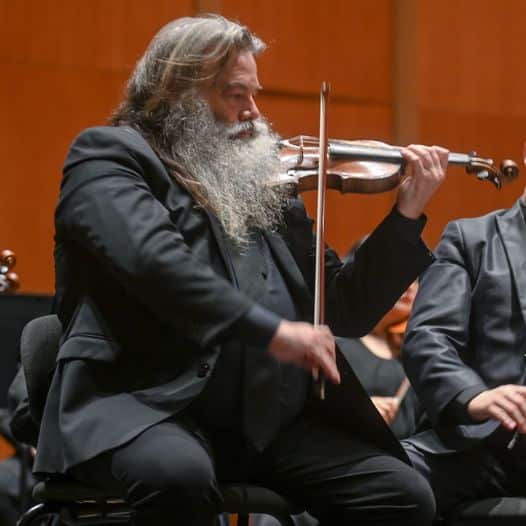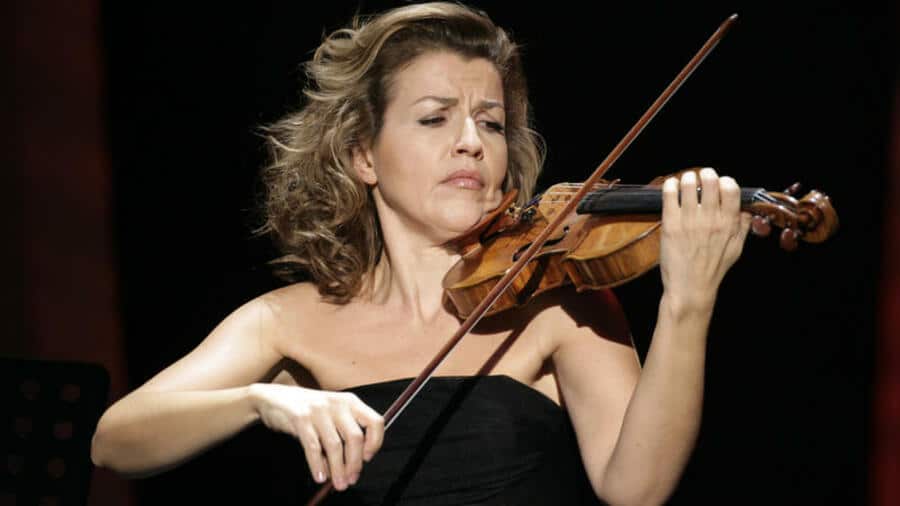Review: New York Philharmonic plays Hitchcock, and loses
OrchestrasOur critic Susan Hall went to see and hear the NY Phil take on a Bernard Herrmann Hitchcock score. It turned out quite scary, and not in a good way.
By Susan Hall
The New York Philharmonic performed Bernard Herrmann’s score for Alfred Hitchcock’s movie Vertigo. Norman Huynh of the Bozeman Symphony conducted. The film ran on a huge screen above the orchestra.
Bernard Herrmann competes with John Williams and Ennio Morricone for top position on the all-time great movie composers’ list. His relationship with Hitchcock was shattered at the end, but Martin Scorsese would give him work (Taxi Driver) until his dying day.
Hitchcock’s head-driven filmmaking led to increasingly kinky takes on human relationships. These were matched by Herrmann’s own oddity and worked in the end against the alliance. Can two men who are deeply odd at first get along in their strangeness and then fall apart because of it?
Both director and composer invested incredible detail in the Vertigo story. This does not add up to a sweeping drama. In fact, as the story gets kinkier and kinkier, we realize it isn’t going to be kinky enough for the 21st century.
Yet the score is meticulously written. A complex story combines a doppleganger with a long dead Spanish great grandmother (yes, we hear a habanera), and acrophobia. The film opens with brilliant camera shots depicting the fear of falling mixed with a wish to fall: a forward zoom shot combines with a reverse tracking shot. Herrmann picks this image up, building the Vertigo chord, a major triad packed on top of a minor triad.
The swirling ascent to putative passion in the first Kiss of James Stewart and Kim Novak recalls Dooley Wilson at the piano in Casablanca. In Rick’s Cafe, a sigh is just a sigh. Vertigo is full of delicious suspended sighs.Yet in Vertigo, a Kiss is no longer just as Kiss. Herrmann brings it into the big time, but not with Wagnerian erotic passion—orgasmic chromaticism and painfully withheld resolutions creating the blend of love merged with death. Acrophobia is simply anxiety.
While Herrmann has said that music can uniquely express what people are thinking and feeling, his score feels like Mickey Mousing – if there’s obsession on the screen, you’re going to get it in the music.
The story, which fascinated Kim Novak because it was a new take on Hollywood’s predilection for renaming and redesigning its female actors, now seems restrained. The music, scored conventionally for strings, brass, woodwinds and percussion, is not rescued by an organ and vibraphone. While Hitchcock’s instructions to Herrmann called for obsession and longing, neither the film nor the music reach heights possible when these themes are fully expressed.
The separated music and film may be the culprit. The original package is designed for delivery as one experience. Concert films with scores performed live are delivered in two parts.
The mix of sounds provided in the film’s track did not work in the new Wu Tsai Theater at Lincoln Center. This is not the hall’s fault, but rather issues that arise as various sound elements combine.
The Philharmonic Orchestra captured the many dimensions of the score–bringing out the thread offered at the opening: the Vertigo chord and the love motif. Yet dialogue, particularly when there was no music, blasted out. The thud of a glass on a table boomed. Whatever the origins of the sounds we heard, they did not mix well or, in fact, at all.
In filmmaking post production, all the elements are mixed. Sound engineers say this would be possible with a dialogue track, a sound effects track and a live orchestra. Yet the commitment of time and work this requires are not being undertaken by anxious Symphony organizations.
In the US, classical music producers look to various visual forms to attract a waning audience. Successful motion pictures (Vertigo originally failed at the box office) seem like a safe choice.
Another response to attracting an audience is the concert or semi-stage performance of opera in the concert hall. Foregoing the visual and focusing on the drama in the singing voice, the Berlin Philharmonic’s New Year’s Eve performance of the first act of Die Walkyrie was brilliant (and erotic). The Boston Symphony put on a thrilling concert version of Elektra and the New York Philharmonic has created Bluebeard with Nina Stemme. Helping an audience focus on great sung music by stripping away the staging is a path not so often taken. Yet often when it is, it is highly successful. If orchestras are unwilling to spend the money required to get a good sound mix in live performance of film scores with film projections, they might program this sound choice.






Why not just turn on the subtitles and mute the film? Everyone’s there to hear the orchestra, I assume.
Muting the dialogue would be silly because most of the movie has no music, so the audience would be sitting there watching a silent film. It’s possible to deal with the dialogue and sound effects so they aren’t extremely loud. Apparently the NYP didn’t do a good job.
Orchestras playing the score behind popular films are often sold-out performances, and good for the bank account–these concerts support less popular concert evenings.
You don’t really know this film, do you, perturbo? To say that “most of the movie has no music, so the audience would be sitting there watching a silent film” – especially about VERTIGO – is ridiculous. You won’t find many other Hollywood films which actually had more “music only” scenes than this film. Think of all those sequences that had zero dialogue: the rooftop chase that starts the film; Scotting first seeing Madeleine as she finishes dining at, and leaves, Ernie’s restaurant; Scotty following Madeleine’s car through San Francisco… silently… TWICE; watching her in Podesta Baldocchi buying the nosegay; watching her walk into and through Mission Dolores and its cemetery; seeing her pull up to the Palace of the Legion of Honor and following her into the gallery where he watches her, silently; following her car into the Presidio and out to Fort Point, where he watches her jump into the Bay; the two of them “wandering” through the redwood forest; the whole “nightmare and dawn” sequence after Madeleine has committed suicide; Scotty retracing his steps around the city – going back to Ernie’s, going back to the gallery, going back to the front of Madeleine’s apartment building – all the time thinking he sees Madeleine at each of these places until it’s revealed that these are just look-alike “ghosts,” not really Madeleine; and then he spots the woman who turns out to be Judy, who he follows up to her hotel room; the two of them walking along the park at the Portals of the Past; we the audience seeing Judy’s transformation back into Madeleine as her hair color is changed, then watching Scotty anxiously paces Judy’s hotel room while he waits for her to come back from the beauty parlor, and finally she’s transformed into Madeleine, coming out of her bathroom with her hair in its “correct” off-the-shoulder spiral bun. There is very little dialog through ALL of these sequences. They are entirely carried by Hitchcock’s visuals and Herrmann’s score. It is a masterpiece of composing married to a masterpiece of filmmaking. “…most of the movie has no music…” could not be farther from the truth.
This review completes fails to mention these 4 performances were completely sold-out. Seems something is working.
They sold on a promise…kudos to the Phil’s marketing department. Production apparently, not so much.
Thank you so much for posting this review of a concert I am sorry I missed. Vertigo remains my favorite film, as its combination of music and visuals is unsurpassed, in my opinion. I know Ms. Hall listened attentively, but I beg to correct her on several points: 1) Both a vibraphone and a Hammond organ are featured in the score- please check out the scene with Stewart and Novak in the redwood grove. 2) Other musical scholars have indicated that the compound chord used in the opening title sequence is a combination of a minor triad and major 7th- I have played this tune myself and confirm it is the correct combination. The effect remains startling.
I cannot comment on the lack of proper blending of dialog, sound effects, and live music in this particular presentation, but do agree that such balances for the film should be obtained with proper sound mixing at the time the movie itself is being prepared for theatrical release. Sadly, that mix in some of today’s films is very upset, to the extent that the music or sound effects can overwhelm dialog clarity- this issue is particularly evident in the films of Christopher Nolan.
I think it’s a great idea to run programs of this type to remind people of the virtuosity required to play music at the professional levels to which we are accustomed. Having them perform in the setting of a superlative film will attract people to attend. To watch a live orchestra have to play in exact synchronization with an already prepared film is nothing short of miraculous, clearly exceeding in difficulty what was needed by musicians playing the same score in the recording studio in snippets when the movie is being assembled. They had the luxury of correcting mistakes- the orchestras playing in these live performances do not. Bravo!
Lastly, I feel that the repertoire of conventional concert performances could be significantly improved by broadening the selection of composers, some of which wrote movie scores, as well. I know John Williams has been deservedly accorded this honor, Hermann deserves greater exposure. There are many wonderful English composers, such as Delius and Finzi, who never get a hearing, either, nor even Boston’s own Walter Pistion. It’s a hackneyed phrase, but truly “variety is the spice of life.”
“Yet in Vertigo, a Kiss is no longer just as Kiss. Herrmann brings it into the big time, but not with Wagnerian erotic passion—orgasmic chromaticism and painfully withheld resolutions creating the blend of love merged with death. Acrophobia is simply anxiety.”
Ms. Hill must love reading her own reviews. Probably out loud, in front of a mirror too. What clap trap.
Lol. You are so spot on. Can’t wait for her to savage Maurice Jarre’s score in David Lean’s hack production of Lawrence of Arabia.
The writer wasn’t savaging the score. She was, in apparently reasonable terms, regretting the lack of care in sound mixing before the final sign off. This deeply spoils the listening experience and is heresy after the years of training and practice by the performers not to mention the genius of composers.
You ought to read the review again.
Aside from the sound mix, it’s clear that Ms. Hill doesn’t like the film, the score, the director and the composer. One wonders why she bothered attending.
Meanie! I enjoyed that piece of articulate mental gymnastics.
Let’s face it the majority of moviegoers today are trying hard enough to hear and understand the dialogs let alone the music. Music criticism is irrelevant at these live orchestra film screenings.
Having said that, I did see an excellent screening of West Side Story at the Hollywood Bowl 2 summers ago. The LA Phil & Dudamel performed and synched with the film perfectly.
This is a pretty unfair review.
“In filmmaking post production, all the elements are mixed. Sound engineers say this would be possible with a dialogue track, a sound effects track and a live orchestra. Yet the commitment of time and work this requires are not being undertaken by anxious Symphony organizations.”
In my experiences working on films with major Symphony orchestras, I would say a lot of time and work goes in to trying to get a good blend between orchestra, dialouge, and sound effects. Dialouge and SFX each have their own sound channel. I have found especially with older films – the quality of these sound effects can be lacking.
Think about something like Star Wars where you have moments where the orchestra is playing full force accompanying a combat scene with lasers, light sabers, and explosions. And you also have intimate scenes with characters whispering. It is a huge challenge to get the whole thing balanced just right. Often times you have the Assistant Conductor out in the hall working with the sound engineers on the fly just to get something remotely decent. Cringe review.
I saw “Amadeus” with the Cleveland Orchestra in Severance Hall. There was no problem hearing the dialogue and sound effects, and they were well balanced with the orchestra and solo pianist (Joela Jones). This kind of production can be done well!
I attended Thursday’s performance and loved it. The orchestra was splendid and, as ever, the movie thrilled. My only complaint would be some members of the audience who found every occasion to laugh inappropriately … but that’s standard with dumbed down audiences today. I’d love to see another Hitchcock film done, maybe Rear Window.
I attended two of the four nights – superb performances both – but the audience laughter was profoundly out of place. Especially when Scottie tells Judy to color her hair – so utterly tragic – his surrender to crazed obsession and her surrender to self-destruction. Is laughing a defense mechanism because otherwise the scene is too difficult to watch?
That would be rather difficult, Rear Window features mostly “diegetic” music or source music and is specifically mixed into the scenery.
What were they laughing at? The nightmare sequence I’ll bet.
Years ago I saw Night of the Hunter at a museum showing in LA and the entire audience was howling at the screen like it was a camp festival.Very disturbing.
Shame, shame, shame on that audience! Night of the Hunter is such a profound statement on loss of childhood innocence in a world where evil lurks everywhere. As my girlfriend said to me re the audience laughing at Vertigo, “If they can’t appreciate classic films, why are they here?”
I was at Friday’s performance and was also disturbed by the ongoing laughter. What were they laughing at, exactly? I never thought of Vertigo as humorous, other than maybe two minor moments between Scottie and Midge at the beginning of the film.
“While Hitchcock’s instructions to Herrmann called for obsession and longing, neither the film nor the music reach heights possible when these themes are fully expressed.”
Hmmmm. This is a criticism of the original film and music? Don’t see it.
Playing to a film score is one of the most technically complex things modern orchestras undertake. Given the source material of older films it is almost impossible to seperate dialogue, Foley, and any specialty music that might not be achieved by the orchestra into discrete tracks which the sound engineer is able to have half a chance of mixing satisfactorily. Add to that most concert halls are far too live to keep the orchestra from overpowering the tracks and most films are presented with one music rehearsal and one technical rehearsal which is not sufficient time to get the nuances even for the best engineer.
With all of that they are almost always guaranteed sell outs and revenue positive.
Everyone is entitled to their own opinion. However most film historians, critics and fans of cinema recognize Vertigo as one of the top 5 films ever made. It may not be “kinky” enough for shallow 21st century thrill seekers like Ms. Hall, but the cinematic theme of obsession is rightly celebrated as magnificent and the scoring by Herrmann is acclaimed as one of the finest film scores ever written. It sometimes does not feel real to me when a “critic” just feels the need to be contrarian. I recently attended a showing of the film to a packed house at Richmond’s Byrd theater. The filmgoers gave an ovation at film’s end and many were talking about the music. And many were first time viewers. Oh well, I guess that’s what makes the world go round.
Hitchcock and his masterpiece Vertigo certainly don’t need a minor critic to validate his creation or the major contribution of Bernard Hermann.
The work of art is the film; an orchestra’s diddling with it is like having one of those visual art “immersive experiences” as if they are somehow magnifying the works of master like Monet or Van Gogh.
The original is always better.
Yeah. Nuh. I think “Vertigo” is over-rated. The music most certainly is not. I have studied the film at university and seen it many times. I think Kim Novak was weak as an actress and she just couldn’t keep up with Stewart. That scene where he’s dragging her back up the stairs of the tower (one of the finest performances in film history from Stewart, BTW)….Novak was not believable. She just merely sounded breathy and whispery, like Nicole Kidman when she’s trying to be dramatic!! And, as for the nun coming up suddenly and “Marion” falling out. That just didn’t work!! You never got that sense of fear and intensity from Novak to justify the final act.
The rest of the film was flawed because of its sheer length and some wooden acting (Gavin Elster).
I just couldn’t suspend disbelief, so there you are!!
I would just like to call to your attention, if you view the movie again, the marvelous physical acting of Kim Novak when Stewart forces her up the steps at the end. She actively fights him pulling her toward the stairs while allowing herself to be pulled at the same time. It’s a microcosm of all the dualities that haunt the film, and she does it entirely without words. Her performance as Judy Barton breaks my heart every time.
You claim to “have studied the film at university and seen it many times” yet you don’t seem to know that Ms. Novak’s other character – besides “Judy” – is named “Madeleine,” not “Marion” (who shows up later in Psycho!). Your opinions on the film are as flawed as your memory for names.
Thank you, absolutely right!
Yes. it’s a very odd review — like the reviewer just stumbled into the theater and thought. “What’s this?”
“Hitchcock’s head-driven filmmaking …”
What? Is this referring to psychological content or a Glasgow Kiss?
I’m grateful to Slipped Disc for its commitment to classical culture, but not for this so-called review. It’s more a collection of random thoughts, many of which reveal a lack of knowledge and/or attempts to seem smarter than thou. The NY Phil played superbly and with feeling, and seeing the actors’ extraordinary performances on a screen that large revealed new subtleties and depth. Both nights I was there were sold out and closed with enthusiastic applause.
I’ve been to several presentation like this and the dialog track of the movie is the weak part. The acoustics of a concert hall that do well for the orchestra are exceedingly poor for conveying the recorded dialog.
I’m not saying the dialog should be eliminated, I’m saying more thought needs to go into the sound system that presents it.
Or… radical thought… how about some genuine silent movies that don’t need the sound system? Some had good original scores composed for them upon release and some have good scores composed for them in recent times.
I love Bernard Herrmann‘s scoring of Hitchcock films… And I think Vertigo is one of the great films.
‘While Herrmann has said that music can uniquely express what people are thinking and feeling, his score feels like Mickey Mousing – if there’s obsession on the screen, you’re going to get it in the music. ….’
Followed by this: “While Hitchcock’s instructions to Herrmann called for obsession and longing, neither the film nor the music reach heights possible when these themes are fully expressed.”
Diametrically opposed, no?
People have loved this score for decades. The review is off.
Ah, is this reviewer at all familiar with the movie?
This review makes it sound like it just came out!
Nothing from NYC can do well on this website.
Curious. I have no idea who the talent is in this sort of production, but the BSO did a fairly successful West Side Story under the big screen.
Bunch of nonsense typed onto a sheet of cheap paper. Who are you to even chirp one word about Hitch’s monumental film masterpiece or Hermann’s brilliant and shock-filled score? Get lost!